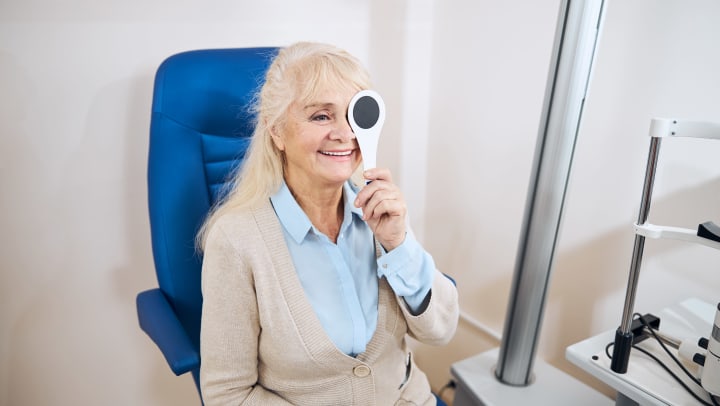Vision loss is often considered a typical side effect of aging, with approximately one-third of Americans over the age of 65 experiencing some form of vision-reducing eye disease. However, there are several simple steps you or your loved one can take to maintain your peepers. Learn how to prevent, recognize, and manage vision loss as you or your loved ones age.
Common Causes of Age-Related Vision Loss
There are several eye diseases that are primarily responsible for pronounced vision impairment among the elderly. These include glaucoma, cataracts, macular degeneration, and diabetic retinopathy. Diet and exercise measures can help ward off or slow the progression of some eye diseases, but it is also important to get a comprehensive annual eye exam. Many of these conditions have few obvious symptoms early on, but can be treated very effectively through medication and other measures – especially if diagnosed at the early stages. If the cost of an eye exam is a deterrent, EyeCare America offers referrals for low-cost and free eye evaluations and treatment.
Wear Shades
Did you know that ultraviolet (UV) radiation doesn’t just cause sunburns and damage to your skin? It can also harm your eyes and contribute to the formation of cataracts. Any time you’re out in the sun, wear sunglasses and/or a wide-brimmed hat to block this harmful radiation. The skin on your face, scalp, and neck will also thank you.
Maintain Healthy Diet & Exercise Habits
Regular moderate exercise has many physical and mental benefits and can also help you maintain visual acuity as you age. According to a recent University of Virginia School of Medicine study, this type of exercise regimen can reduce the risk of macular degeneration and other eye diseases by up to 45%, while an earlier study at the University of Wisconsin found that exercising three or more times per week could reduce the risk of age related macular degeneration by up to 70%.
Diet is also an important factor in keeping your eyes healthy and preventing or slowing the progression of cataracts, macular degeneration, and diabetic retinopathy. Maintain a diet rich in antioxidants by consuming plenty of green leafy vegetables, berries, citrus fruits, nuts, sweet potatoes, eggs, walnuts, salmon, and soybeans. Moderating the intake of sugary foods and those high in processed carbohydrates can also help keep blood sugar and blood pressure in check, protecting the miniscule blood vessels in the retina.
Give Your Eyes Regular Breaks
In this digital age, chances are you or your loved one spends a significant amount of time staring at phone and computer screens, which can result in damaging eye strain. Try to stick to the 20-20-20 rule in order to avoid over-exerting your eyes. Every 20 minutes, spend 20 seconds staring at a spot 20 feet (or more) in front of you. For example, look up and focus on the picture on the wall across the room or on the birdhouse in the tree just outside your window.
Common Indicators of Eye Problems
If you notice that you or a loved one is experiencing any of the following symptoms (especially if they persist), contact an ophthalmologist and schedule a detailed eye evaluation as soon as possible.
- Loss of vision
- Sudden blurred or hazy vision
- Double vision
- Pain in or around the eye
- Seeing flashes of light in one or both eyes
- Halos around lights at night
- Painful or intense sensitivity to light
- Discharge or foreign body in the eye
- Changes in the color of the iris or clarity of the cornea
- New onset or sudden change in floaters or flashing lights
- Distortion or waviness of vision
Follow these tips to help preserve your eyesight and get the most out of life. For more health and wellness tips for older Americans, visit the Brightwater Senior Living blog.
